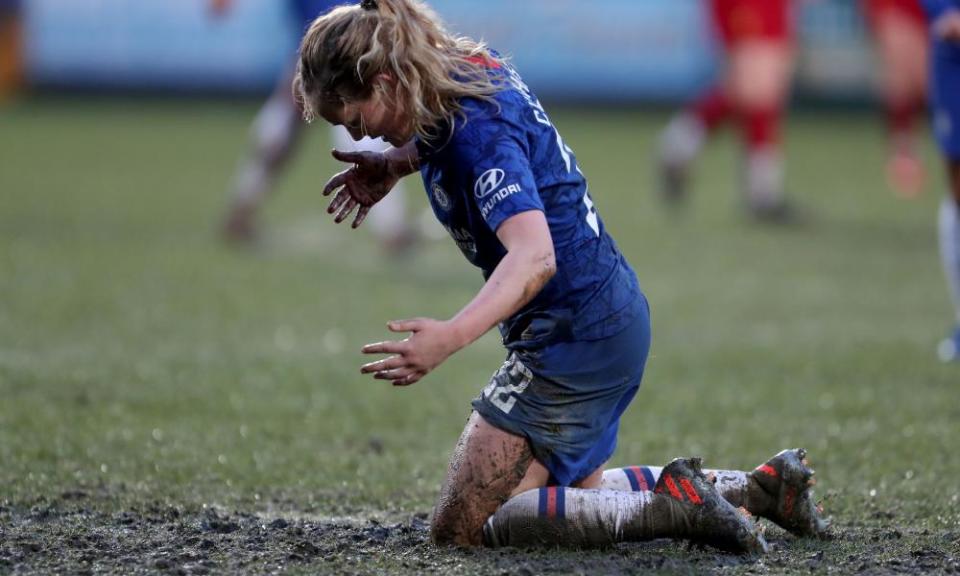Project Big Picture's little nod to women's game not wanted or needed
Maybe we should be grateful that those responsible for Project Big Picture have included support for the Women’s Super League within their plans for total football domination.
Nestled within the proposed £100m “gift” to help the Football Association combat the £300m-plus hit it has taken because of the Covid-19 pandemic is £10m to bail out the WSL and Women’s Championship, a commitment that “a new independent league for the women’s professional game will finally be developed and funded” and reportedly more than £50m a year for the WSL, Championship, Women’s FA Cup and grassroots.
Related: 'Mo Marley? Everybody loves her' – England stars praise retiring coach
In a sense, that women’s football has been included in a plan for a complete restructure of the financing and governance of English football is a step forward and a £50m-a-year investment, albeit with no guarantee it would not come to an end or be rolled back on, dwarfs the £11m the FA put into women’s football in 2019.
However the broader context that sits around this nod to women’s football (the brevity is telling in itself) leaves severe doubts about the intentions behind such commitments and the identity of those making these proposals does the same.
Every club is entitled to contribute to the debate on the future of the women’s game. But there is something extremely ironic in the fact that a proposal to change the way the Women’s Super League is run and organised has come from a plan drafted by the Manchester United and Liverpool owners, Joel Glazer and John W Henry respectively.
The Glazers shut down the Manchester United women’s team in 2005 shortly after they took ownership of the club. Why? Because women’s football was not “part of the core business”. The club repeatedly rebuffed pressure to relaunch a women’s team despite the growing popularity of women’s football, before, as one of only two Premier League sides at the time to not have a women’s side, finally relenting in May 2018.
Liverpool, meanwhile, ended the domination of Arsenal in the women’s game with back‑to‑back league titles in 2013 and 2014 but have since gradually run their women’s team into the ground through underfunding and essentially arms-length management, with the team training and playing at Prenton Park. At the close of the 2018 season a player exodus hinted at internal strife. One game into the new season a rebuilt side saw the manager Neil Redfearn walk out of the door he had barely walked in. This year the club were relegated from the top flight on a points-per-game basis in the season the men’s team lifted the Premier League trophy for the first time in 30 years.
Let’s be clear, the suggestion that the women’s game would benefit from being independently run is not new.

The FA and Premier League have been in talks for almost a year about a possible takeover. A split from the FA, which has one hand tied by its numerous other responsibilities, could be beneficial because independent governance could allow decisions to be made solely in the interests of the women’s game. Clubs are thought to favour independence over the Premier League running matters, and the Project Big Picture plan indicates some gauging of the room. However the inclusion of this idea with limited detail or substance is disappointing.
Manchester United and Liverpool may think they are giving the women’s game what it desperately wants but if their vision for an independent WSL reflects their proposals for the Premier League and invests power in a small number of “big” clubs it is neither wanted nor needed.
The FA, for all its faults, and in particular those people there who have pioneered the women’s game in recent years, deserves praise and respect for a strategy that has brought women’s football to the cusp of profitability and to a point at which the previously indifferent snouts of Manchester United and Liverpool are sniffing around it. The entire proposal, with the veneer of credibility through bailouts and money, is about protecting and expanding their investments with governance proposals that entrench power at the top. They are here at the women’s football table because there is money to be made.
If Liverpool and United were serious about bailing out women’s football and then supporting its development they would recognise the FA, fans, clubs outside the big six and club staff (many of whom have dedicated thousands of volunteer hours) deserve more respect than what looks like a profit-driven footnote to their power grab.

 Yahoo Sport
Yahoo Sport 





































